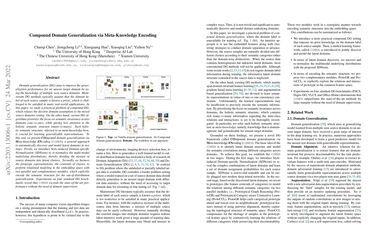Compound Domain Generalization via Meta-Knowledge Encoding
Domain generalization (DG) aims to improve the generalization performance for an unseen target domain by using the knowledge of multiple seen source domains. Mainstream DG methods typically assume that the domain label of each source sample is known a priori, which is challenged to be satisfied in many real-world applications. In this paper, we study a practical problem of compound DG, which relaxes the discrete domain assumption to the mixed source domains setting. On the other hand, current DG algorithms prioritize the focus on semantic invariance across domains (one-vs-one), while paying less attention to the holistic semantic structure (many-vs-many). Such holistic semantic structure, referred to as meta-knowledge here, is crucial for learning generalizable representations. To this end, we present Compound Domain Generalization via Meta-Knowledge Encoding (COMEN), a general approach to automatically discover and model latent domains in two steps. Firstly, we introduce Style-induced Domain-specific Normalization (SDNorm) to re-normalize the multi-modal underlying distributions, thereby dividing the mixture of source domains into latent clusters. Secondly, we harness the prototype representations, the centroids of classes, to perform relational modeling in the embedding space with two parallel and complementary modules, which explicitly encode the semantic structure for the out-of-distribution generalization. Experiments on four standard DG benchmarks reveal that COMEN exceeds the state-of-the-art performance without the need of domain supervision.
PDF Abstract CVPR 2022 PDF CVPR 2022 Abstract

 MNIST
MNIST
 SVHN
SVHN
 Office-Home
Office-Home
 PACS
PACS
 MNIST-M
MNIST-M